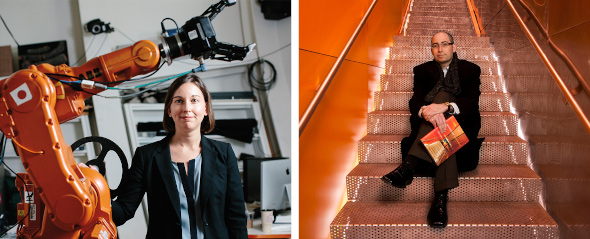A responsible path to computing advances
Professors David Kaiser and Julie Shah lead initiative to embed ethical and social responsibilities in MIT's computing/advanced tech teaching, research, and public engagements.

L to R: Julie Shah; photo by M. Scott Brauer; David Kaiser; photo by Len Rubenstein
“We want to make sure that there are substantial, unavoidable moments throughout undergraduate training that equip our students to analyze and make sense of hard problems involving social and ethical responsibility.”
— David Kaiser, Germeshausen Professor of the History of Science, MIT School of Humanities, Arts, and Social Sciences
Excerpt from MIT Spectrum / Spring 2020
It's little wonder that David Kaiser and Julie Shah ’04, SM ’06, PhD ’11 feel a sense of urgency in their new positions. “Whether it’s the large-scale collection of seemingly innocent data from individuals, or the use of artificial intelligence to create deep fakes in political disinformation campaigns, our norms, rules, and laws haven’t caught up,” says Kaiser, the Germeshausen Professor of the History of Science, and professor of physics. “We need to address many challenging questions head on, and right away.”
Named associate deans of the MIT Stephen A. Schwarzman College of Computing (SCC) in September, Kaiser and Shah are leading the initiative to embed the social and ethical dimensions of computing into the teaching, research, and public engagement tasks of the SCC.
“There is a huge body of knowledge from the social sciences, humanities, and arts to help us frame problems in computing and develop systems for the betterment of mankind, and we need to start tapping into it,” says Shah.
“We need new ideas and insights coming from multiple directions,” says Kaiser. “Getting discussions and collaborations going across different disciplines, and with groups outside the Institute, is both a goal and a measure of our success.”
This commitment to cooperation and bridging courses of study is apparent in projects already taking shape... For instance, collaborations between faculty teaching computing classes and those from fields across the humanities, arts, and social sciences will enable new emphases on global policy implications and social responsibility.
“At the top of our list of learning objectives is the idea that technology alone can’t solve many problems, and that our tools come with values incorporated in them,” says Shah. “We need to complicate students’ thinking, so as they code, experiment, and build systems, they are cognizant of ethics and impacts.”
More MIT SHASS stories on Ethics, Computing and AI
Suggested links
Ethics, Computing, and AI: Perspectives from MIT
Faculty from all five MIT schools offer perspectives on the societal and ethical dimensions of emerging technologies. Practical, inspiring, concerned, and clear-eyed views from an optimistic community deeply engaged with one of the most consequential questions of our time.
Browse the Series
Computing and AI: Humanistic Perspectives from MIT
"With a sense of promise and urgency, we are embarked at MIT on an accelerated effort to more fully integrate the humanistic and technical forms of discovery in our curriculum and research, in our institutional structure, and in our habits of mind and action."
Browse the Series
Making a Better World: AI and Computing
David Kaiser's MIT webpage
MIT Program in Science, Technology, and Society
MIT Department of Aeronautics and Astronautics
MIT Schwarzman College of Computing